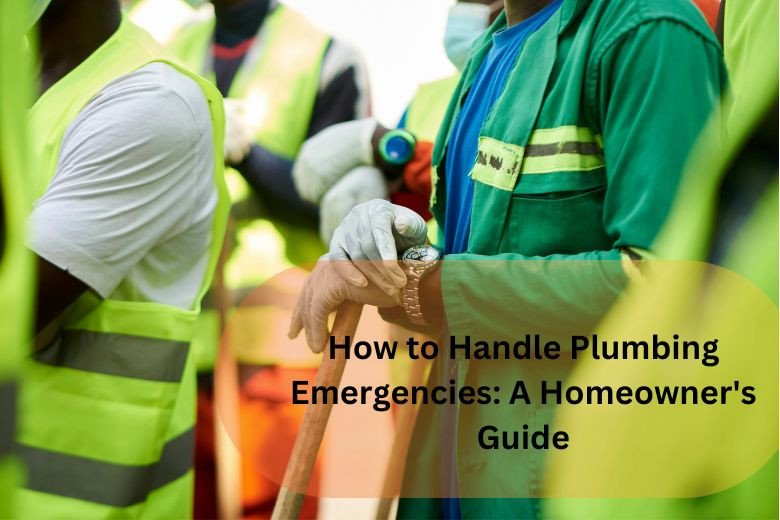How to Handle Plumbing Emergencies: A Homeowner's Guide
Posted on August 01, 2024 by Admin

Plumbing emergencies can prove to be stressful and, in most cases, disruptive. Therefore, it is important to know how one can effectively manage them—not just for the sole purpose of minimizing damage but also to get your home running normally again. Here is a homeowner's guide on how to deal with common plumbing emergencies, together with steps one has to take when dealing with a plumbing crisis.
Must Read : Understanding Water Heater Options: Tank vs. Tankless
Leaky Pipes
Immediate Action:
-Turn Off the Water: Water going into the house is usually shut off at the point where the water service enters the home. Shut this off to shut the water supply. Logic states this is the first deed to avoid further flooding and damage.
- Drain the Pipes: Open any faucets that feed off the system to drain all the water that might be left behind in the pipes. This will help to decrease pressure and subsequently reduce water damage.
Temporary Repairs:
- Seal the Leak: Both plumber's tape and a pipe repair clamp can seal small leaks temporarily. Neither is intended to be a permanent fix, but they will hold things together until a plumber arrives.
- Call a Pro: In case the leak is huge or if you are not sure of its nature, you will need to call in a licensed plumber for assessment of the nature of the leak and to make necessary repairs.
Clogged Drains
Immediate Action:
- Plunger Use: You can remove small blockages with a plunger, but be sure to apply the appropriate type of plunger for the specific fixture you are troubleshooting. A flange plunger, for example, has a funnel cuff on the bottom that hugs the rim of a toilet bowl and would be used for unclogging toilets.
- Try a Drain Cleaner: If you can't plunge the clog away, try a chemical drain cleaner. Again, however, be very cautious about using these cleaners as they have the ability to corrode pipes when they are not used thoughtfully.
Must Read : The Impact of a New Roof on Home Value
Common Mistakes to Avoid:
- Not Too Much Chemical Cleaner: Over-usage eats through the pipes and worsens the problem.
- Avoid Tools: If the clogs are especially bad, steer clear of wire hangers or other tools that can scrape your pipes. Just call a professional.
- Plumber Time: If the clogs recur, or if you have recurring drainage issues, you'll be better off talking to a plumber with more specialized equipment to solve the problem.
Must Read : Eco-Friendly Roofing Options: Sustainable Choices for Your Home
Burst Pipes
Act Fast :
- Shut Off the Water: This will most effectively and quickly turn off the water at the main valve.
- Turn Off Electricity: If water has leaked onto electrical outlets or appliances, shut off power to prevent electrical shock.
Temporary Repairs:
- Water Containment: See if towels, buckets, or even mops could contain it and mop up the water. It may help prevent further destruction of the water on your floors and walls.
- Apply Temporary Fixes: If at all possible, fit a repair clamp or tape onto the pipe over the burst area temporarily.
- Call in a Pro: If you have a burst pipe, you will need professional help as soon as possible—a plumber to replace or repair the damaged section and check if there are any possible problems caused by it.
Faqs
-
1. What do I do during a plumbing emergency if I can't find the main water shutoff valve?
If you are unable to find the main shut-off, then look for local shut-offs. Most are under sinks or behind toilets. If you cannot locate a shut-off valve or aren't sure what to do, call a professional plumber for assistance. Many can also advise over the phone, and if needed, send one of their service technicians.
-
2. How can I avoid plumbing emergencies in the future?
Regular plumbing maintenance avoids emergencies. To save a lot of money on repairs and replacements, allow a professional plumber to inspect your system once every year to recognize various issues. Avoid flushing undissolvable materials or pouring grease down the drain and clean your drains regularly to prevent blockages. Insulation on pipes in cold areas of your house is also advisable to avoid freezing and bursting.
-
3. When should I do DIY repairs, and when should I call in a professional?
DIY repairs would only be in order when the problem is minor. For example, small leaks or minor clogs can be easily repaired by you with simple tools. Serious problems involving serious leaks, burst pipes, and serious blockages call for a professional plumber. Such effort given to do issues much more complex than your competencies may result in further damage and more expensive repairs.
Recent Post
- Top Plumbing Service Providers in Arizona, USA
- Top 10 Electrician Service Providers in Alabama, USA
- Top 20 Roof Repair Service Providers in Alabama, USA
- The Role of Roof Insulation in Energy Efficiency: Tips and Tricks
- Understanding Roof Damage from Wildlife and How to Prevent It
- How to Choose the Best Roofing Contractor for Emergency Repairs
- Roofing Maintenance for Historic Homes: Preserving Architectural Integrity
- The Importance of Proper Attic Ventilation for Roof Health
- How to Identify and Prevent Roof Mold and Mildew
- The Best Practices for Removing Snow from Your Roof